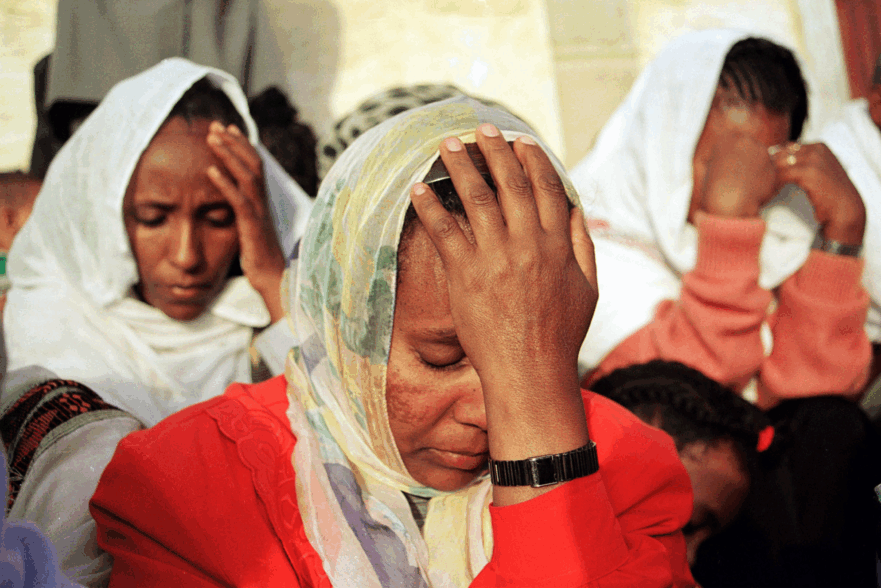“In my distress I called upon the LORD, and cried to my God: and he did hear my voice out of his temple, and my cry did enter into his ears.” (Psalm 18:6)
“We really appreciate you being a voice for us. We are so glad we found someone to speak on behalf of our fathers, who have been incarcerated for two decades. Their absence has been incredibly tough on the families, especially on our mothers, who shouldered the burden of raising children while facing financial hardship and social exclusion.
Their imprisonment marked a turning point in our lives. Losing our fathers and protectors was devastating. We didn’t have anyone to step in as father figures—no one to guide us, mold us, or show us how to grow into mature men and women equipped with knowledge and wisdom. It has been a long and painful journey, filled with fear and hardship. The stress took a toll on our mothers’ health. They battled chronic illness and were often bedridden from the pain.
Sadly, both the wife of Rev. Gebremedhin Gebregergish and Dr. Fustumbrhan Gebrengus passed away, worn down by the emotional and physical toll.
As David said, ‘I am weary with my groaning; all the night make I my bed to swim; I water my couch with my tears.’ (Psalm 6:6)
We are in the same situation. Waiting for our fathers to be released from prison is a never-ending nightmare. It’s like our whole lives are on hold—we’re unable to move forward. We are praying for a better life, free from this long-suffering imprisonment and pain—not just for our fathers, but for thousands of Eritrean prisoners across the country.”
—Anonymous
The Hidden Toll on Families of Religious Prisoners
Many Eritrean Christians live with a quiet grief—relatives held for decades without charges, without contact, and without legal recourse. One such man, now in the U.S., carries the memory of his father’s arrest in 2004, when the pastor was taken during a crackdown on unauthorized religious gatherings.
His story is not unique.
Families of the religiously incarcerated often face unimaginable burdens: separation, stigma, financial collapse, and institutional neglect. These challenges are made worse by systems that treat religion as a threat to national security, leaving little room for compassion, due process, or accountability.
Challenges Faced by the Incarcerated
- Lack of Religious Accommodations:
Even in countries that claim to protect religious freedom, inmates may be denied access to religious texts, diets, or the ability to practice their faith. - Punitive Policies:
Regulations like mandatory haircuts or bans on religious clothing and diets often violate deeply held religious beliefs. - Intentional Isolation:
Authorities may cut off prisoners from their communities and families, intensifying the punishment and severing spiritual ties.
The Collateral Damage: Families Left Behind
- Financial Strain:
Legal fees, prison-related costs, and the loss of income can devastate a family’s finances for years. - Emotional and Psychological Impact:
Watching a loved one suffer while facing public shame or silence leads to grief, depression, and helplessness. - Barriers to Communication:
Access to information is often blocked. Families may wait months—or years—without hearing from their loved ones. - Stigma and Isolation:
In many communities, having a family member in prison brings shame, further isolating survivors and reducing their access to support. - Inhumane Bureaucracy:
Navigating prison systems often means encountering opaque processes and arbitrary decisions that prioritize control over compassion.
Systemic Religious Oppression
- State Control and Suppression:
The incarceration of religious individuals is often used to crush dissent or control faith communities. - Erosion of Religious Freedom:
In many nations, including Eritrea, religious identity alone can lead to arrest—even for members of “legal” denominations.
Background: The Eritrean Context
Hundreds of Eritrean Christians are currently detained in secretive and unlawful conditions. Many have been imprisoned for years—some for decades—without charges, trials, or family contact. Conditions are harsh, with reports of torture, overcrowding, and denial of medical care or religious materials.
According to the U.S. Commission on International Religious Freedom (USCIRF) 2025 Annual Report, Eritrea remains among the worst violators of religious freedom globally. Only four religious groups are officially recognized (Coptic Orthodox, Sunni Islam, Roman Catholic, and the Lutheran-affiliated Evangelical Church of Eritrea), and even their members face persecution.
Key Facts:
- The US Dept of State has designated Eritrea a Country of Particular Concern (CPC) for systematic, egregious religious persecution.
- It ranks 6th on the Open Doors World Watch List of most dangerous countries for Christians.
Conclusion
Behind every religious prisoner is a family—grieving, struggling, surviving. Their stories rarely make headlines, yet they carry the emotional weight of an unjust system every single day. By shedding light on these hidden impacts, we can push for global accountability and amplify the quiet voices calling for freedom, dignity, and faith without fear.
To learn more about the Religious Liberty Partnership’s #Voices4Justice campaign to release seven Eritrean Christians click here.
Featured image caption: Eritrean women praying. Credit: Reuters

